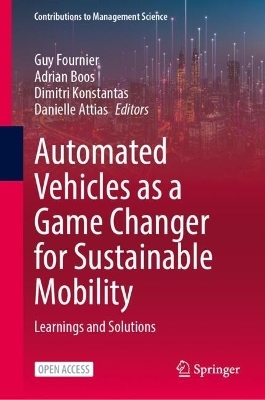
Automated Vehicles as a Game Changer for Sustainable Mobility
Springer International Publishing (Verlag)
978-3-031-61680-8 (ISBN)
This open access book explores a vision for a sustainable future in urban mobility through the AVENUE project, showcasing full-scale demonstrations of automated minibuses in European cities. AVENUE pioneers on-demand, door-to-door services, challenging traditional fixed bus itineraries. It delves into the implementation of automated vehicles, emphasizing safety, services, cybersecurity, and accessibility. Part two evaluates the economic, environmental, and social impacts on companies, citizens, and cities. By integrating automated vehicles into Mobility-as-a-Service and Intelligent Transport Systems, the book argues for the using of automated vehicles as game changer towards a transformative shift to sustainable, citizen-centric mobility. It advocates for efficiency, flexibility, and resilience of the transport system without imposing coercive transformation policies.
Guy Fournier is Professor affiliated to Pforzheim University in Germany and CentraleSupélec, Univesité Paris Saclay, France. He is an expert in sustainable mobility and system innovation which serves general interest. His core interest and expertise rests within automated vehicles, MaaS (Mobilty as a Service), self-learning ITS (Intelligent Transport System) and LaaS (Logistics as a Service). He was board member and responsible for the impact assessment of the H2020 AVENUE Project and is currently working on ULTIMO Horizon Europe project as scientific coordinator.
Adrian Boos is an economist and political scientist with a PhD in environmental economics. He has several years of professional experience in management consulting, but has worked primarily (for more than 15 years) as a researcher and lecturer in the fields of economics and sustainability. He was involved in the AVENUE project as a senior researcher at Pforzheim University and currently holds this position in the follow-up project ULTIMO, which runs until 2026.
Dimitri Konstantas is a Professor at the Geneva School of Economics and Management (GSEM) of the University of Geneva (Switzerland), member of the University Informatics Center (CUI)) and director of the Information Science Institute (ISI). With expertise spanning e-commerce, information security, mobile and e-health services, and shared mobility solutions, he has over 200 publications and extensive involvement in European projects. As coordinator of the H2020 AVENUE project, he deployed the first regular public transportation services with fully automated minibuses. Currently, as Associate Coordinator & Technical Manager of the Horizon Europe project ULTIMO, he aims to deploy economically viable public transportation services with Automated vehicles.
Danielle Attias is an Emeritus Professor at Université Paris-Saclay, CentraleSupélec, Laboratoire Génie Industriel (France). Prof. Attias was scientific coordinator of the H2020 AVENUE project. She's a member of the Sustainable Economy research team at ECP's Industrial Engineering Laboratory. As an expert at the Club de l'Orme (CEA/Saclay) and a member of the I-tésé Institute for Techno-Economic Systems (since 2009), her research focuses on innovation economics, electromobility economics, crisis management, and finance, with keywords including electromobility, managerial crises, financial crises, value, and innovation.
1. Introduction.- Part 1: The AVENUE project: implementing Automated Mini-buses for "door-to-door" and "on-demand" passenger transportation in Geneva, Lyon, Luxembourg and Copen-hagen.- 2. AVENUE Site demonstrators: Geneva, Lyon, Luxembourg, Copenhagen.- 3. Automated Minibuses: state of the art, improvements through AVENUE.- 4. Safety, security and service quality for Automated Minibuses: state of the art, technical requirements, data privacy in case of incident.- 5. In-vehicle services to improve the user experience and security when traveling with Automated Minibuses.- 6. Cybersecurity and data privacy: Stakeholders' stand on regulations and standards.- 7. Technical cybersecurity implementation on Automated Minibuses with SIEM (Security Information and Event Management).- 8. Persons with reduced mobility (PRM) specific requirements for passenger transportation services.- 9. Stakeholder Analysis and AVENUE Strategies.- Part 2: Impact assessment of AVENUE.- 10. Research Approach: Introduction to SUMP and AVENUE Methodology.- 11. Technical impact assessment: obstacles and developments of Automated Minibuses for Public Transport.- 12. Economic impact assessment: local service costs of automated vehicles for public transport.- 13. Environmental impact assessment: automated minibuses for public transport.- 14. Environmental impact assessment: externalities of automated electric vehicles for public transport.- 15. Social impact assessment: Changing mobility behaviour by understanding customer needs and attitudes.- 16. Governance impact assessment, regulatory recommendations, and challenges.- 17. Sustainability assessment of the integration of automated minibuses in urban mobility systems - learnings from the AVENUE project.- Part 3: Future vision of AVENUE.- 18. System innovation in passenger transportation with automated minibuses in ITS: the citizen centric approach of AVENUE.- 19. Transition planning towards a sustainable urban mobility ecosystem.- 20. Conclusion.
| Erscheinungsdatum | 16.07.2024 |
|---|---|
| Reihe/Serie | Contributions to Management Science |
| Zusatzinfo | XXVIII, 509 p. 189 illus. |
| Verlagsort | Cham |
| Sprache | englisch |
| Maße | 155 x 235 mm |
| Themenwelt | Naturwissenschaften ► Biologie ► Ökologie / Naturschutz |
| Technik ► Fahrzeugbau / Schiffbau | |
| Wirtschaft | |
| Schlagworte | Automated Vehicles in ITS • Automated Vehicles in MaaS • Automotive Industry • AV technology provider • Business models • Change Management • Citizen Centric • Cooperative, Connected and Automated mobility • Environmental sustainability • Horizon 2020 AVENUE project • Intelligent Transport System • Mobility-as-a-Service • mobility solutions • OEM • open access • Public Transport Authorities • Public Transport Operators • Sustainable Mobility • Systemic Approach • Transformation strategy • Transition management |
| ISBN-10 | 3-031-61680-4 / 3031616804 |
| ISBN-13 | 978-3-031-61680-8 / 9783031616808 |
| Zustand | Neuware |
| Haben Sie eine Frage zum Produkt? |
aus dem Bereich


